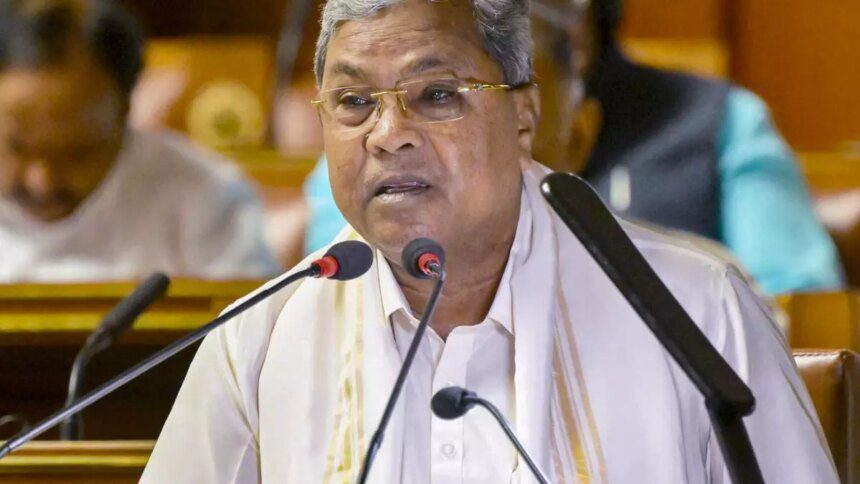The Karnataka Budget for the 2025-26 financial year focuses heavily on enhancing “Brand Bengaluru,” allocating substantial resources for the city’s development. A proposed ₹27,000 crore initiative aims to build a 73 km road, revitalizing the long-stalled Peripheral Ring Road project, which will now be referred to as the ‘Bengaluru Business Corridor.’ To tackle traffic congestion, multiple measures have been proposed.
Chief Minister Siddaramiah, presenting the State Budget for the 16th time, stated, “Our Government prioritizes the foundational infrastructure in Bengaluru, which significantly contributes to the State’s economy.” The yearly grant budgeted for Bengaluru will increase from ₹3,000 crore to ₹7,000 crore for the current year. A new Special Purpose Vehicle will be set up to efficiently allocate these grants and expedite critical development projects. Moreover, ₹1,800 crore has been earmarked for the “Brand Bengaluru” initiative, encompassing 21 different schemes for the fiscal year 2024-25.
Acknowledging Bengaluru as the leading contributor to the State’s revenue, the government has proposed bold projects to enhance infrastructure and service efficiency while managing traffic more effectively through the ‘Brand Bengaluru’ initiative. There is also an intention to alleviate pressure on the city by promoting the development of secondary and tertiary cities.
Among the significant announcements is the transformation of the Peripheral Ring Road project into the ‘Bengaluru Business Corridor,’ with a planned investment of ₹27,000 crore for its construction, supported by HUDCO Bank, and land acquisition is already underway.
A new Bengaluru Signature Park will be established in Devanahalli, spanning 407 acres, with ₹50 crore released from the State funds for the necessary connectivity infrastructure, including a new flyover.
To promote electric vehicle (EV) manufacturing and usage, ₹25 crore will be allocated for an international standard testing track and an EV cluster with shared infrastructure in the Bengaluru area.
Taiwan’s Foxconn has initiated a mobile phone manufacturing facility in the Devanahalli Industrial Area with a total investment of ₹21,911 crore, complemented by a ₹6,970 crore incentive from the Electronics System Design and Manufacturing (ESDM) sector, as detailed by the Chief Minister.
In addition, plans are in place to establish a Japanese Industrial Park at the Tumkur Industrial Node, aligning with the Chennai-Bengaluru Industrial Corridor project. The World Expo in Osaka, Japan, will serve as a platform to attract further investments to the State.
A second phase of the Quantum Research Park will receive a ₹48 crore grant over three years in collaboration with the Indian Institute of Science (IISc) to foster quantum technology development. There’s also a proposal to allocate ₹57 crore for the reconstruction of the Bengaluru Bio-Innovation Center, which suffered significant damage from a fire.
The Bengaluru Majestic bus stand will be revamped through the Project Majestic initiative, using a public-private partnership model to create a transport hub integrated with a commercial center.
To further alleviate traffic issues and enhance transportation, the government plans to convert major roads in the city into signal-free corridors. A significant feature of this plan is the construction of a 40.5 km double-decker flyover, which will cost ₹8,916 crore, along with Namma Metro Phase-3. Additionally, a 300 km road network will be established at a cost of ₹3,000 crore utilizing canal buffer zones. Upgrades of the BBMP’s arterial and sub-arterial road network, spanning 460 km, will also proceed at a cost of ₹660 crore, and 120 km of flyovers and grade separators will be built across Bengaluru for enhanced connectivity.
Currently, Namma Metro accommodates around 8.5 lakh daily passengers, with 68 stations across a 79.65 km network. Plans are underway to extend the network by adding 98.60 km in the next two years, reaching Devanahalli.
The Bengaluru Suburban Railway Project will develop a 148 km rail network with 58 stations for an investment of ₹15,767 crore, with work already progressing on two out of four proposed corridors.
New satellite bus and market facilities will be constructed in Bengaluru, with the bus stand at KR Puram developed under a public-private partnership to mitigate the growing vehicular congestion in the city.
Under the ‘Brand Bengaluru – Green Bengaluru’ initiative, work is ongoing for 14 lakes through BBMP, with an allocation of ₹35 crore. The rejuvenation efforts for Varthur and Bellandur Lakes have been taken up by the BDA at a cost of ₹234 crore.
As part of disaster mitigation efforts, the Minor Irrigation Department will undertake 41 lake-filling projects in Bengaluru Rural District with an investment of ₹250 crore. Additionally, the city’s stormwater drains will be rebuilt, and lake rejuvenation projects in Bengaluru will receive ₹239 crore.
A new building at Haj Bhavan will be constructed to improve facilities for Haj pilgrims and their families, while a Buddhist Study Academy will be set up to enhance education and research in Buddhist philosophy. Further, the century-old library at the Mahabodhi Study Centre will undergo digitization and upgrades at a cost of ₹1 crore.
To enhance sports infrastructure in the State, a new district stadium will be built on 20 acres of land in Adinarayana Hosahalli, Bengaluru Rural District. A multiplex cinema complex will also be established on a 2.5 acres plot owned by the Karnataka Film Academy in Nandini Layout, Bengaluru, under a public-private partnership.
CM Siddaramaiah noted the 15th Finance Commission’s recommendation of a special grant of ₹5,495 crore to the State, which includes ₹3,000 crore for lake development in Bengaluru and ₹3,000 crore for the Peripheral Ring Road, amounting to a total of ₹11,495 crore. However, he mentioned that the Central Government has not yet released this grant.










